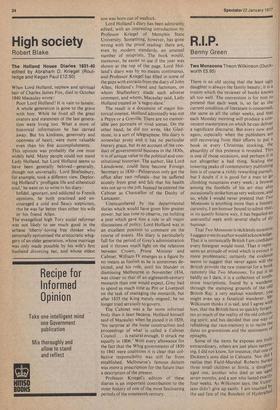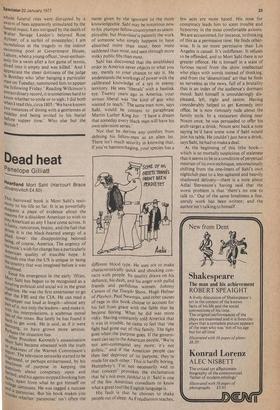111•P.,
Benny Green
Two Monsoons Theon Wilkinson (Duckworth £5.95)
There is an old saying that the least uglY daughter is always the family beauty; it is a truism which the reviewer of books knows all too well. The convention is for him to pretend that each week is, so far as the current condition of literature is concerned, the same as all the other weeks, and that each Monday morning will produce a convenient masterpiece on which he can deliver a significant discourse. But every now and again, especially when the publishers are still recovering from their efforts to put a book in every Christmas stocking, the absurdity of this pretence is revealed. This is one of those occasions, and perhaps it is not altogether a bad thing. Scaling the towering peaks of contemporary publishing lists is of course a richly rewarding pursuit, but I doubt if it is good for a man to go climbing mountains every week; a browse among the foothills of his art May also occasionally strike him as very welcome, and so, while 1 would never pretend that TWO Monsoons is anything more than a literary curiosity, I am honour bound to admit that, in its quietly bizarre way, it has beguiled an uneventful week with several shafts of sly humour.
That Two Monsoons is recklessly eccentric I suggest even its author would acknowledge. That it is intrinsically British I am confident every foreigner would insist. That it represents an attitude of mind which is extinct is more problematic; certainly the evidence seems to suggest that never again will the British provide the raw material for a book remotely like Two Monsoons. To put it as baldly as I dare, it is a collection of tombstone inscriptions, found by a wanderer through the stamping grounds of the old British Raj: a very zealous wanderer, You might even say a fanatical wanderer. Wilkinson thinks it is sad, and I agree With him, that the British have so quickly forgot ten so much of the reality of the old colonisi, ing spirit, and has decided that one waY ° refreshing our race-memory is to recite dhet. dates on gravestones and the sentiments epitaphs. Some of the items he exposes are truy extraordinary, others are just plain surpm; ing. I did not know, for instance, that one Dickens's sons died in Calcutta. Nor did realise that Field-Marshal Roberts burl° three small children at Simla, a daughteAr aged one, another who died at sea age' seven months, and a son who lasted exactlY four weeks. As Wilkinson says, the Victor ians didn't give up easily. I am touched the sad fate of the Resident of Hyderaba whose funeral rites were disrupted by a swarm of bees apparently stimulated by the funeral music. I am intrigued by the death of Walter Savage Landor's beloved Rose Aylmer, of a surfeit of pineapples; I am incredulous at the tragedy in the indoor swimming pool at Government House, Lahore, when a young officer, 'over-enthusiastic for a swim after a hot game of tennis, dived into it empty and was killed.' And I appreciate the sheer dottiness of the judge in Bombay who 'after hanging a particular man on Tuesday, summoned him to appear the following Friday.' Reading Wilkinson's extraordinary record, it is sometimes hard to know whether to smile or to sigh; I did both When I read this, circa 1805: 'We have known two instances of dining with a gentleman at midday and being invited to his burial before supper time,' Who else but the British?



































 Previous page
Previous page